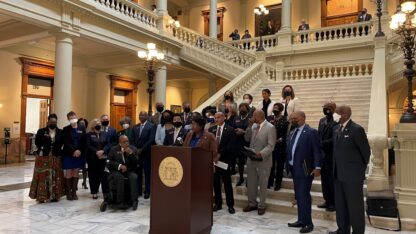Over cheeseburgers, onion rings and fried chicken salads, people shared what they’d heard. Something “crooked” was going on across the country.
In California, for instance, Democratic Gov. Gavin Newsom hadn’t actually won his recall election last year by the 3 million votes that was reported.
“They found boxes of ballots months later, all for the other guy,” someone whispered.
The TV over the bar at the Flying Machine restaurant in Lawrenceville, Ga., was turned to Fox News, and Republicans gathered to talk about what they’ve been talking about for much of the past year and a half: voter fraud.
“How many feel that the 2020 elections were a little sketchy?!” asked DeKalb County GOP Chair Marci McCarthy, to cheers. “Everybody should be raising their hands!”
The restaurant event was the 12th and final stop in a three-day “election integrity” tour put on by one of the nation’s preeminent election deniers, Rep. Jody Hice, R-Ga.
Hice objected to the 2020 election results at the U.S. Capitol on Jan. 6, 2021, just hours after it had been stormed by a violent pro-Trump mob.
And now, the former pastor is running to oversee voting in Georgia as the secretary of state.
“If ever the sacred trust of the voice of the people is ever compromised or violated, then we as a republic are in serious, serious trouble,” Hice told the crowd at the Flying Machine. “And I believe with all my heart that was broken in Georgia in this last election cycle.”
There has never been evidence to support that claim. No major or widespread issues with the 2020 election were uncovered anywhere in the United States, and paper ballots in Georgia were recounted multiple times, including once by hand during a risk-limiting audit.
Yet according to recent polls, a majority of Republican voters nationwide still believe there were problems. Which is why the incumbent in the Georgia secretary of state race, Brad Raffensperger, is now facing multiple Republican primary challengers.
On the back of Hice’s campaign posters, there is a cowboy boot and the words “Boot Brad.”
Under siege from his own party
A soft-spoken former engineer, Raffensperger didn’t enter politics until he was in his mid-50s. He was elected to his first term as secretary of state in Georgia in 2018, and less than three years later, he received a phone call that changed his life.
“All I want to do is this — I just want to find 11,780 votes,” said former President Donald Trump, effectively asking Raffensperger to overturn the election results in Georgia in his favor.
The secretary declined. “Well, Mr. President, the challenge that you have is the data you have is wrong,” Raffensperger said.
But experts worry that election-denying candidates like Hice will be more willing than Raffensperger was to subvert the will of the voters in future races, due to their willingness to spread election misinformation.
An NPR analysis found that there are at least 20 such Republican candidates in secretary of state races across the country this year.
“The reasons why Trump’s attempt to overturn the 2020 election failed is because there were state officials who refused to substantiate his claims of fraud,” said Franita Tolson, an election law expert at the University of Southern California. “These folks really are gatekeepers.”
Hice told NPR in an interview that he thought it was appropriate for Trump to call Raffensperger after the election. And he declined to answer whether he would have responded differently to Trump’s request.
“The president was, from the way I listened to it, clearly saying [to Raffensperger], ‘There were obvious problems in this election and do your job and investigate,’ ” Hice said. “That’s a reasonable request.”
Over the past 15 months since that call, Raffensperger, the chief election official in Georgia, has spent time almost every day correcting the same misinformation Trump cited when he made his ask.
In the call, for instance, Trump falsely said thousands of dead people voted in Georgia in 2020.
“There were four. That’s one, two, three, four. Not 4,000,” said Raffensperger at a Rotary Club Q&A he attended last week in Dalton, Ga.
At these sorts of events, Raffensperger doesn’t raise his voice or really project much emotion at all. It’s a stark difference from Hice’s sermonizing about voter fraud, which Raffensperger says is by design.
Republicans in 2020 were too “spun up” and polarized about voting by politicians like Trump, he said, which led to the Jan. 6 attack on the Capitol.
Just weeks before that riot, a member of Raffensperger’s staff warned at a press conference that someone was “going to get killed” as a result of the misinformation swirling around the election.
“Our entire society gasped and realized that [Jan. 6] was a bridge way too far,” Raffensperger said in an interview with NPR. “I think now we’re trying to figure out, how do we go forward? We have to have conversations that are respectful, based on truth. I think when we do that, I think that we can start moving forward.”
A different kind of race
When Raffensperger was first elected secretary of state, the position was still thought of as a sleepy, bureaucratic position. Many, if not most, voters across the country couldn’t name the person who held the position in their own state.
But 2020 turned the election community upside down. Raffensperger has become a household name, and now people more than ever need to be paying attention to down-ballot races, says Adrienne Jones, a political science professor at Morehouse College.
“You need a game plan. You need to know what the secretary of state is. … You need to know who the judges are,” she said. “It’s got to become a more active, full-bodied engagement.”
One sign that people are sensing the urgency is the money.
The race in Georgia, and secretary of state races in other swing states, are flooded with campaign donations in a way they never have been before, according to ongoing analysis from the Brennan Center for Justice.
Hice leads the Georgia field with $1.6 million raised so far, according to the Brennan Center’s analysis.
Larry Norden, the senior director of the elections and government programs at the Brennan Center, says it’s a good thing that voters are paying attention.
But he also worries about the existential stakes being putting on these sorts of races, considering most voters need to have confidence in election results for a democracy to function, and not everyone’s candidate can win.
“The treatment of election officials,” Norden said, “and secretaries of state specifically, as something more than umpires … but actually team players who can tilt the field one way or another, is not good for American democracy.”
Copyright 2022 NPR. To see more, visit https://www.npr.org.
9(MDAxODM0MDY4MDEyMTY4NDA3MzI3YjkzMw004))

9(MDAxODM0MDY4MDEyMTY4NDA3MzI3YjkzMw004))








